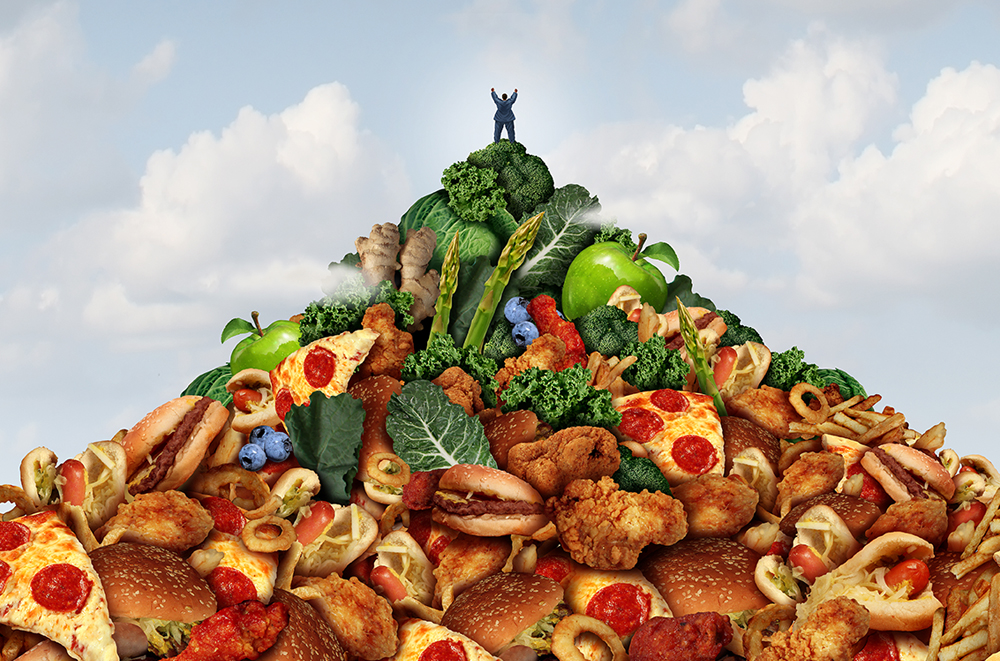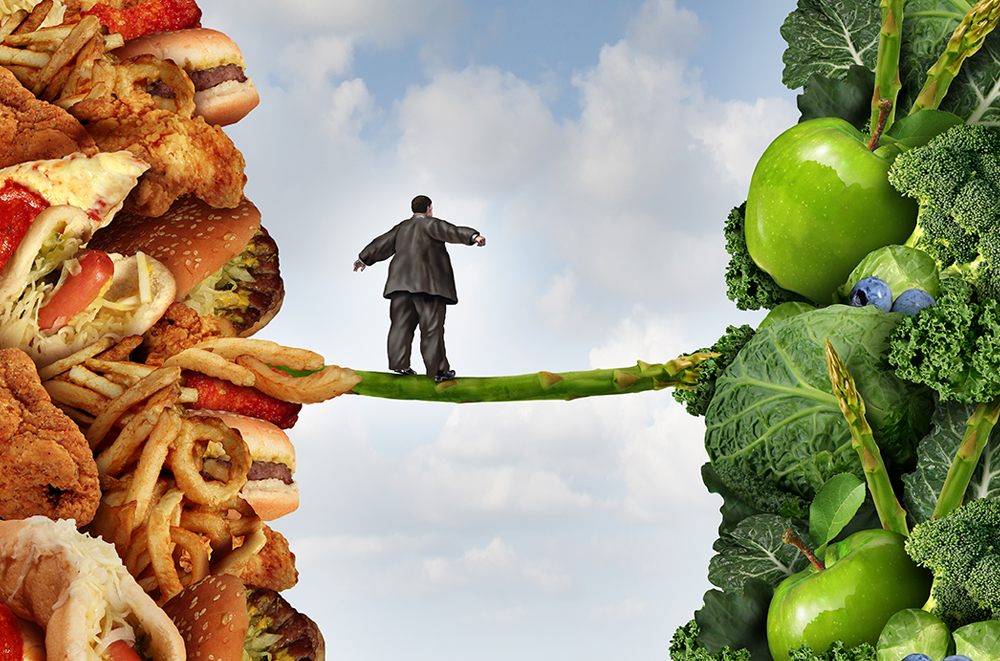It’s absolutely cringeworthy—the number of absurd New Year resolutions we’ve made over the decades to lose weight and get fit.
Some of them never got traction and were but a memory by Valentine’s Day. Others were embraced whole-heartedly—we lost the weight and ran our first 5k—but then the whole shebang went off the rails. By Labor Day, we’d gained it all back and returned to our stressed-out, sedentary habits.
Clearly, the word “sustainability” needs to apply as much to our lifestyles as it does to the environment. Another word that might help? Accountability.
It’s time to rethink approaches to “healthy” living that do nothing but foster deprivation, frustration, and shame, and instead, focus on lifestyle changes that will set us up to succeed. Small adjustments built upon over time that are based on common sense, mindfulness, and expert advice tailored to our individual needs have a far better chance of taking hold.
Take Paul Conrad for instance. Five years ago, the Kansas City native (now living in Valencia, Spain) was 80 pounds heavier.
“My weight had been the major factor in every aspect of my life for as long as I could remember,” Conrad says. “I had gone to see my doctor, and she was starting to suggest medication for things like blood pressure and diabetes. When I asked her, ‘This is only temporary right? You don’t think I’ll need to take this forever?’ she just sort of looked at me and replied ‘probably.’ I was in my mid 20s.”
Then he signed on with Josh Feagans, owner of Fitness Unlimited in Westwood Hills. The first thing Feagans did was encourage Conrad to make one change, outside of their gym workouts.
“The first two weeks to a month, he just had me focus on eating clean, with no restrictions on how much I ate or counting of calories,” Conrad recalls. “From there he would slowly introduce new things like counting calories, hydration, meal planning, and a higher protein diet.
“My key to success was a combination of actually seeing results and developing an understanding for exercise and nutrition. With the amount of misinformation and crazy dieting out there, it’s really no surprise that many fail or give up,” he says. “To this day, I still enjoy peanut M&Ms and KitKat bars. I just have to ensure that I don’t go hog wild with my indulgences.”
Whether he knows it or not, Conrad is practicing intuitive eating, an approach to food that focuses on ending the cycle of chronic dieting and emotional eating, while adopting more mindful eating habits.
Or as Ariel Johnston puts it, finding a balance between food and life without stressing over food or restrictive diets.
“A lot of fad diets aren’t healthy for you long-term,” says Johnston, owner of The Tasty Balance Dietitian of Kansas City. “There isn’t necessarily a correlation between losing weight and becoming healthier. It’s about losing weight in a healthy way and replenishing your body with what it needs.”
With intuitive eating, a nutritional philosophy that’s growing in popularity among dietary experts, the focus is often on adding to the diet.
“Sometimes it’s more whole grains or more fruits and vegetables. You should be adding rather than taking away,” says Johnston.
“Just because you eat unhealthy food doesn’t make you a bad person. It’s how we feel about ourselves when we eat that food.”
— Ariel Johnston
The clients she’s had success with have changed their relationships with food and the way they think about it.
“If I have a client who doesn’t want to allow herself ice cream or any candy or cookies or whatever, and then she gives in and has it, it starts a shame spiral, and she feels bad. Like she doesn’t have any willpower. The shame comes when you break that diet, and it’s harder to get back to eating healthy.”
The shift toward truly healthy and sustainable eating, she says, comes when you stop categorizing food as good or bad.
“Just because you eat unhealthy food doesn’t make you a bad person,” Johnston says. “It’s how we feel about ourselves when we eat that food. With high-protein, low-carb diets a lot of people think they’re going to cut it out forever. But how is that going to be sustainable and what happens when they start adding carbs back in. Is that going to create anxiety around the food?”
One Overland Park doctor, James Mirable, an obstetrician/gynecologist, offers a way to lose weight quickly with a keto-style diet that transitions into a more intuitive eating approach once his clients reach their goal weights.
His clinic, Mirabile M.D. Beauty, Health and Wellness, offers a three-stage, physician-supervised, program called Medi-Weight Loss that’s specifically tailored to each client via blood tests and a thorough physical exam.
It begins with the acute stage—a high-protein, low-carbohydrate diet to put clients into ketosis, a metabolic state during which the body lacks sufficient glucose for energy and burns fat instead.
Clients are given a list of foods they should eat, recipes and meal ideas and have weekly appointments with staff nutritionists for accountability and diet modifications. They also get vitamin and fat-burner injections.
Clients typically lose between 5 and 10 pounds the first week of the program, then, 2 to 3 pounds each week after that during the first month, according to Britni Briney, a nutritionist at the Mirabile clinic.
Once they reach their goal weight, clients move on to a short-term maintenance phase during which calories are increased and carbohydrates are reintroduced and the body is kicked out of ketosis. This is the point where they’re learning a new lifestyle that can be sustainable.
“These are things people are going to be eating the rest of their lives so we want them to be aware of how big servings should be when they do start incorporating these things back in,” Briney says. “So we go over portion sizes. A lot of patients do plan to keep a low-carb diet because they tend to feel better. But they don’t have too. We do stress a diet with not so much sugar and excess carbs.”
The final step is the wellness phase where clients check in once a month to ensure they’re not falling back into old habits. Still, a piece of chocolate or a reasonably sized dessert are allowed now and then.
Sustainability and accountability are just as important for the way we move our bodies as they are for what we put into them.
Feagans, owner of Fitness Unlimited, gets twice as many new clients each January than he does other months of the year, and they’ve all made resolutions, which is fine, but…
“They should plan on it being a lifestyle change rather than a resolution, and easing into it,” says Feagans. “Maybe eating better or just starting a walking program—something you like doing, not something that is for a month and is difficult to sustain and, ‘I don’t have the time’ and ‘I don’t have the money.’
“It’s more, ‘I want this for a lifetime—the long-term better me, the stronger me, being able to see my kids grow up and my grandkids grow up,’” he adds.
“That’s where, for me, as a personal trainer with one-on-one training, it’s a better way to go, because you’re held accountable—the appointments are set, you’ve committed to the financial aspects.”
Feagans says his clients range from semi-pro and Division I college athletes to people over 50 who want to get back into shape because they consistently feel bad and don’t like having to be on medications.
He creates radically different types of programs for each of those types of people. Whereas the athletes can jump right into hardcore, high-intensity programs, that’s not the case for most of his other clients
“It’s amazing some people who come in here, they haven’t moved in a really long time,” he says. “They sit at a desk all day, and when we start our first session, within ten minutes, they’re spent. A big percentage of the population is really sedentary and not moving at all.”
Feagans starts with an assessment of each client to pinpoint their physical strengths and weaknesses. Typically, he says, they have poor core strength and upper-body posture from sitting at a desk.
“It’s strengthening those and incorporating cardio and strength training,” he says. “It’s really judging where they are—what they’ve been doing and not doing, then getting them to their goals.”
He does it by tailoring a program to each of them that’s not so grueling that they hate it and want to quit.
“We start with baby steps. You have to walk before you can run,” he says. “Within the first 30 days it’s amazing the results we see. Their energy levels are up, they’re sleeping better, they’re eating better. And then it gets better in subsequent months.”
He’s also noticed that their confidence spikes, and they change the way they carry themselves.
“My life is completely different now. It’s hard for me to even understand my former self and how much the weight was really holding me back.”
— Paul Conrad
Conrad thinks there’s a big misconception that an effective workout and diet means being miserable. “Trainers at commercial gyms know this and will work people like dogs, even if it’s not optimal, so they feel like they’ve gotten their money’s worth,” he says. “Josh started me off with some light High Intensity Interval Training and plyometric, stuff that he knew I could do and later transitioned it to more core and strength exercises.”
Conrad lost another 20 pounds after working with Feagans because he was able to incorporate and continue what he learned from their time together.
“My life is completely different now. It’s hard for me to even understand my former self and how much the weight was really holding me back,” he says. “When I was heavy, I really couldn’t do anything that didn’t involve sitting for prolonged periods. Now I’m working and studying abroad, simply enjoying life. I’m happily in a relationship for almost three years, and we both find the time to go to the gym and workout together.”

Meaningful Mindfulness
One other lifestyle change that’ll help you get healthier is mindfulness.
Not only does it force you to slow down a bit and eliminate stress, but it can also help you lose weight.
In fact, mindful eating is the first thing that pops to mind for Shane Ledford, co-founder and mindfulness teacher at Meditate KC.
“A lot of times while we’re eating, we have the TV on or are sitting at a desk and inhaling whatever it is,” he says. “With mindful eating, hopefully you’re not eating as much. Rather than gorge on a whole bag of chips, you’ll eat just 10 chips and really savor them.”
Weight Watchers is now promoting mindfulness as part of a lifestyle, he adds, noting that it also helps with stress in general.
“If you’re stressed you might tend to use drugs or alcohol,” he says. “But if you’re more internal and more mindful you might say ‘Yes, I’m having a bad day today, and I need to take a couple of breaths,’ and not reach for the wine or whatever it may be.”
While there is scant scientific data on the health benefits of mindfulness, studies have shown that meditation boosts brain volume, memory, and satisfaction in relationships while decreasing depression, anxiety and blood pressure. Preliminary studies have also found that it might boost your immune system.
So who’s to say some of these benefits don’t carry over to mindfulness, meditation’s less-intense offshoot, which can easily be incorporated into daily life.
“You can wake up in the morning and sit with yourself for a couple of minutes before reaching for the phone or turning on the TV and saying, ‘Ok, I have a big day at work ahead’ then take a couple of breaths and go over what you have to do.”
He definitely sees an uptick in people wanting to meditate and be more mindful at the beginning of each year.
“There is a form of meditation where you can sit for four or five minutes, but it can also be a lifestyle, where when you’re cutting up vegetables you’re aware that you’re cutting up vegetables,” he says. “Or when you’re sitting at a traffic light, rather than reach for your phone and send a text because you have 30 seconds to kill, you sit with yourself. That’s what a mindfulness lifestyle is.”
Ledford believes that humans were not designed to be constantly engaged—that we’re supposed to be taking breaks, but we’ve gotten away from it because we’re wired all the time.
“People say they don’t have time to meditate, and I say ‘Ok. When you turn on your coffee pot, it takes about two minutes to brew. There are two minutes you can just sit rather than checking Facebook or turning on the TV and getting into all those distractions.’”



